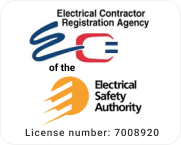Electrical Contractors vs. Electricians. All You Need To Know
If you ever had to call an electrical services company to fix up something in your home, you might have come across the terms “electrical contractor” and “electrician". Although, an average homeowner wouldn’t bother to know the difference between the two and would hire either one to do the work, there is a significant difference between an electrical contractor and an electrician. In this blog, we will look into this difference in more detail and help you better understand who you need to hire for certain electrical jobs. Read on!
What is an electrician?
An electrician is a person who is certified and qualified to work with electrical systems and equipment.
Electricians have two employment options: they can work for an electrical company or contractors or be self-employed as independent electrical contractors. The licensing standards for each function, however, vary.
Additionally, if electricians are engaged in an apprenticeship training programme, they might be further categorized as apprentices, journeymen, or master electricians if they complete additional training and testing.
What is an electrician qualified to do?
As an apprentice, an electrician is required to work under a master electrician's supervision. Once they complete the training, they become qualified to handle jobs such as wiring, troubleshooting and maintenance, underground conduits installation and jobs involving fire safety.
What is an electrical contractor?
Electrical contractors are master electricians that not only provide but also oversee electrical work. They can hire other licensed electricians. While they can perform electrical work, they undergo far more extensive training than apprentices or master electricians.
What is an electrical contractor qualified to do?
Electrical contractors are qualified to oversee projects such as installation, electrical and cabling design, and electrical maintenance for both residential and commercial projects. They can manage anything from simple light fixture replacement to the entire home’s electrical system upgrade. A large electrical project overseen by a licensed electrical contractor provides peace of mind that the work is done according to the highest safety and quality standards.
Electrical contractor vs. electrician. Who should I hire?
If choosing between electrical contractors and electricians seems too perplexing, consider this:
all electrical contractors are electricians, but not all electricians are electrical contractors. Electrical contractors go through an extensive process of education and testing to become licensed. They become licensed electricians at some point, but they also can decide whether they want to upgrade their qualifications and further become a contractor. So next time you need a wire fixed, go for a licensed electrician, but if you are renovating the entire kitchen, a contractor would be able to bring a team of professionals to do the work quickly and efficiently.
Can I do electrical work by myself?
Replacing old light bulbs is a type of repair many homeowners would attempt to do on their own. Even though this type of electrical work is minor and does not require special skills or knowledge, no electrical work should be DIYed whatsoever. Always hire a licensed electrician or electrical contractor to do any kind of electrical maintenance or installation. That way, not only you are ensuring the safety of the work done, but you are also securing a guarantee that in case the new installation fails, you can reach back to the electrical services company to come back and inspect the work done.
Conclusion
As you should have learned by the end of this blog, electrical contractors have more authority over projects. Aside from performing electrical work, they can manage other electricians. However, with more authority, there's also more responsibility, which plays a great role in deciding whether or not to upgrade the license to a contractor's one. We hope this blog helps you clarify the difference between the two professionals and makes it easier for you to decide who to call in the event of an electrical malfunction.


